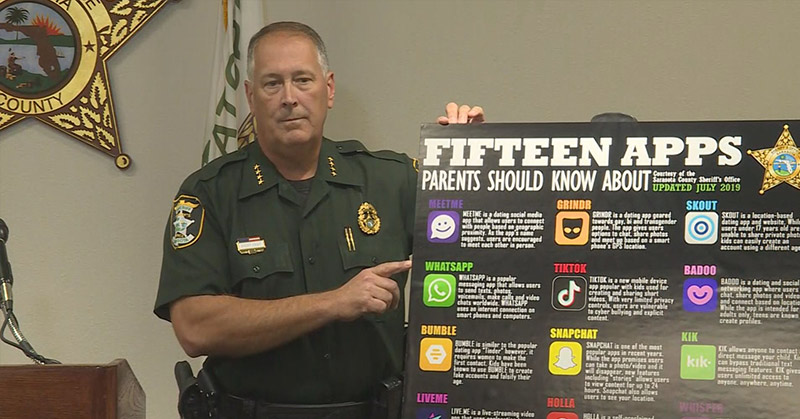On July 26th, the Sarasota County Sheriff’s Office announced to the public that 25 people had been arrested during a four-day bust targeting online predators and human traffickers. (1)
Sheriff Tom Knight said all of the men arrested had been using the internet and mobile applications to solicit children. Between the 25 arrested, there were 38 prior charges and 15 prior convictions. (1)
Since the arrests, the sheriff’s office, along with the Madill Police Department in Oklahoma, has released a list of 15 apps that parents and guardians should be aware of. These apps were found to be the most common means of communication among predators.
A similar list was released in 2018, but this updated version includes the most up to date and relevant information for kids and parents today.
15 Apps Parents & Guardians Need to Know About
- MeetMe: A dating app that connects people based on close location.
- WhatsApp: A messaging app that allows texts, video calls, photo sharing and voicemails with users worldwide.
- Bumble: A dating app that requires women to make the first contact. Law enforcement says kids and teens can create fake accounts and falsify their age (a violation of the Children’s Online Privacy Protection Act).
- Live.Me: A live-streaming app that uses geolocation to share videos. The sheriff’s office said users can earn “coins” to “pay” minors for photos.
- Ask.FM: The sheriff’s office said this app lets users ask anonymous questions and is known for cyberbullying.
- Grindr: A dating app that connects users based on location.
- TikTok: Users create and share short videos. Law enforcement said the app has “very limited privacy controls” and users can be exposed to cyberbullying and explicit content.
- Snapchat: Users take and share photos, texts, and videos. The app shares user location.
- Holla: A video chat app that allows users to meet within seconds. Law enforcement said users have seen racial slurs and explicit content.
- Calculator+: Police say this is one of several apps that are used to hide photos, videos, files, and browser history.
- Skout: A location-based dating app. Although Skout is meant to prohibit minors from sharing private photos, police say children can easily use a false age and create an account.
- Badoo: A dating and social media app where users can chat and share photos and videos based on location. Police say the app makes it easy for teens to create accounts.
- Kik: Kik “gives users unlimited [text messaging] access to anyone, anywhere, anytime,” the sheriff’s office said.
- Whisper: An anonymous social network that lets users share secrets with strangers. Police say it also shows users’ locations so people can meet up.
- Hot or Not: The app lets users rate profiles, check out people in their area and chat with strangers. (2)
Understanding the Children’s Online Privacy Protection Act (COPPA)
“COPPA imposes certain requirements on operators of websites or online services directed to children under 13 years of age, and on operators of other websites or online services that have actual knowledge that they are collecting personal information online from a child under 13 years of age.” (3)
Generally, app or website creators must: (4)
- disclose what information it collects from children, and how it uses that information
- obtain verifiable parental consent before collecting, using, or disclosing information from children
- provide a way for parents to review the information collected from their child and refuse future use
- not require personal information from a child in order for them to participate in a game or prize
- establish a system to protect the confidentiality and security of any personal information collected from children
Tips for Internet Safety
Parents and guardians should have age-appropriate conversations about internet and phone safety with their children on a regular basis.
Teach your kids not to share photos or any personal information (such as their name, age, location, interests) online.
Create the expectations that all passwords to websites and mobile devices must be shared with you for their own safety.
Be familiar with the signs of an online predator targetting your child: (5)
- your child spends long hours online (especially late at night)
- phone calls from strangers
- unexpected gifts in the mail
- your child suddenly turns off the computer when you walk into the room
- your child withdraws from family routines
- your child is hesitant to discuss their online activities
Parents and guardians should also be aware of the signs of cyberbullying: (6)
- visibly upset after using internet or phone
- unwilling to discuss online or phone activities
- withdrawal from family, friends, and interests
- skipping school or avoiding group activities
- unexplained poor behavior
- decline in school performance
- mood swings
- changes in sleep and appetite
- visibly nervous when a phone or computer notification appears
- unexplained desire to avoid using computer or phone
- being nervous or jumpy when getting an instant message, text, or email
Call the National Center for Missing and Exploited Children at (800) 843-5678 and contact your local law enforcement if you discover any uploading, viewing, or sending of explicit materials involving children.

